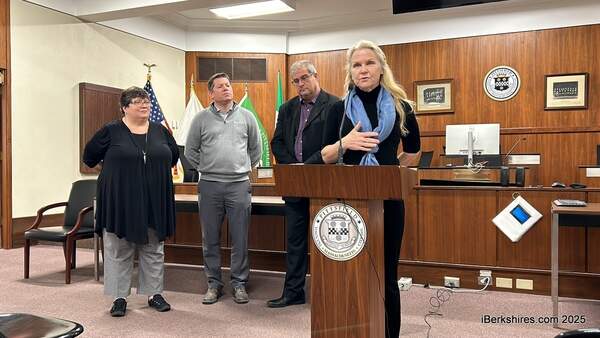Pittsfield Council Rejects Eversource Pole Request for Unpaid Taxes
PITTSFIELD, Mass. — The City Council last week rejected a request for a new jointly owned utility pole from NSTAR doing business as Eversource and Verizon New England because of the electric company's unpaid taxes.
Eversource has been challenging its personal property bill since 2018 and only paying about half. The company owes $3.6 million plus $1 million in interest and fees, totaling about $4.6 million in debts to the city.
A representative from Verizon said the request — made by Eversource — was to place the poles, wires, cables, and related fixtures on the north side of East Housatonic Street about 145 feet west from the centerline of Deming Street.
The pole is intended to better support the existing pole line and allow for cables to continue down Copley Terrace.
Though it is legal for the company to appeal its taxes as long as they are paying half of the personal property amount, the council wanted this unanimous vote to send a message: pay your bills.
"Since we've been using a blended method to appraise the utility since 2018, they have been paying about a little bit over half of what their bill is for personal property," Chief Assessor Paula King said.
"There is by law, the ability to appeal a tax as long as you're paying that portion when it comes to personal property, at least half of the bill."
The case is currently pending before the state Appellate Tax Board.
Councilor at Large Earl Persip III brought the situation to light during a public hearing for the pole.
"I bring this up because there's a pretty hefty tax bill out there and these companies keep coming back for us for these poles and such and we approve them with no kind of pushback or argument for the most part except when the plans are unreasonable," Persip said.
"I think we need to keep a close eye on this, and if this is the way we get Eversource or NSTAR to actually move on some of these back taxes spent going back to 2018, I think this is a way to, I'm not saying tonight I won't vote for this, but I think we need to keep an eye on this and be aware of the future."
His sentiments were well received by the rest of the panel.
Ward 4 Councilor Chris Connell agreed, adding that maybe if Eversource hears that the pole was rejected because of unpaid taxes they may reconsider.
"If you want to force somebody's hand then you've got to start denying some things," he said.
Ward 1 Councilor Helen Moon found it problematic that the company is withholding taxes while people who cannot pay utility bills are not offered the same bailouts and get their power shut off.
"Eversource is a public utility, but they are over $1 billion in revenue last year and it looks like they're withholding millions of dollars in taxes for 87 Massachusetts communities," she said.
"Think about like our residents in Pittsfield who don't pay their Eversource bills and what happens to them."
Tags: delinquent taxes, utility pole,















